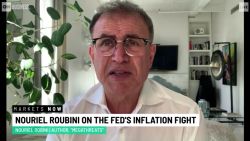A version of this story first appeared in CNN Business’ Before the Bell newsletter. Not a subscriber? You can sign up right here.
Republicans are due to unveil their proposal for a fourth round of US stimulus spending on Monday. With the country’s economic recovery on hold, the pitch — and ability to make it a reality — couldn’t be more important.
What’s happening: Our new dashboard tracking America’s economy shows that the comeback has slid into reverse as Covid-19 infections in the United States surpass 4.2 million. Restaurant reservations have plateaued and hotel occupancy is falling again, while initial claims for unemployment benefits are ticking up.
Anxiety over the deteriorating situation is evident in corners of financial markets. The price of gold, considered a safe-haven investment, surged 2% to an all-time high on Monday, hitting nearly $1,944 per ounce. Meanwhile, the US dollar, which has been on the back foot, hit its lowest level since 2018.
UBS thinks gold prices will hit $2,000 per ounce by the end of September, bolstered by the weaker dollar, which makes it cheaper for foreign investors to buy precious metals. Historically low interest rates also reduce the appeal of other safe haven investments, such as US Treasuries.
But the virus outlook is undoubtedly part of the picture.
“It’s not just gold which has gone up against the dollar, but almost everything,” Societe Generale strategist Kit Juckes told clients Monday. “That’s partly driven by a sense that the US is having a harder time controlling the virus than others, which will see the US economy underperform.”
That makes it crucial that US lawmakers get it right for the next round of relief.
What’s in the bill: White House officials and Senate Republicans are finalizing legislation that would offer another round of $1,200 checks to many Americans, my CNN colleagues report.
It would not renew the full $600 weekly unemployment insurance enhancement due to expire shortly, which Republicans have argued is a disincentive for people to return to work. Instead, workers would be reimbursed for up to 70% of lost wages.
This benefit remains a key point of contention with Democrats and could serve as a barrier to passing the bill before the August recess.
“Let me just say: the reason we had $600 was its simplicity,” House Speaker Nancy Pelosi said Sunday, noting that calculating 70% of someone’s lost earnings would be difficult for administrators. “Why don’t we just keep it simple?”
Goldman Sachs said in a note on Sunday that it thinks a roughly $1.5 trillion bill will get legislative approval before the August break. But big issues are still up for debate, from the extent of unemployment benefits to the fiscal aid for struggling states.
Travel stocks plunge on second wave fears
Travels stocks are getting walloped again in Europe as fears of a second wave of coronavirus infections spook investors.
Ryanair (RYAAY), which on Monday reported a loss of €185 million ($216 million) last quarter, said that a rise in Covid-19 cases across Europe in late fall is the company’s “biggest fear.”
Short-term bookings to places like Barcelona are already taking a hit as infections there rise, Ryanair said. The carrier predicts that its traffic this year will plunge at least 60%, from 149 million passengers last year to 60 million passengers this year at best.
Investor insight: Ryanair’s stock dropped 5% in early trading.
It’s not the only travel company to take a hit. Concerns are growing about a recovery in regional tourism. The United Kingdom said over the weekend that it would require all people returning from Spain to self-isolate for 14 days.
Shares of British Airways owner IAG (ICAGY) plunged almost 9% Monday, making it the biggest loser in the FTSE 100, while easyJet (ESYJY) shed nearly 11%.
Lufthansa’s stock also fell nearly 6%, while shares of tour operator TUI (TUIFF) plummeted 11%. The company canceled all holidays to mainland Spain until August 9.
Still, the euro continued its ascent against the US dollar, rising another 0.4% Monday to nearly $1.17. The currency has gained more than 9% from its recent lows in late March, helped by concerns about the economic outlook in the United States and a big relief package signed off last week by EU leaders.
Hong Kong’s ‘Nasdaq of the east’ makes its debut
Hong Kong’s answer to the tech-heavy Nasdaq has gone live, my CNN Business colleague Laura He reports.
The Hang Seng Tech Index — which tracks the 30 largest tech firms that trade in the city, including Alibaba (BABA) — made its debut on Monday. It got off to a rough start, finishing the day 0.8% lower.
Big picture: The launch comes as the tech sector gains stature in Hong Kong. Companies including Alibaba, JD.com (JD) and NetEase (NTES), all of which trade in New York, have held secondary listings in the Asian financial hub in recent months.
Ant Group, the company behind the Chinese mobile payments behemoth Alipay, last week chose both Hong Kong and Shanghai for its IPO.
The new index, which analysts at Citi dubbed the “Nasdaq of the East,” could help attract quality tech companies to Hong Kong at a difficult moment. The city’s role as a global financial center has been shaken in recent months by tensions between the United States and China, which have intensified as Beijing moves to tighten its grip on the city.
Watch this space: More companies could consider Hong Kong listings. More than 30 US-listed Chinese companies meet requirements for a secondary listing in Hong Kong, including Pinduoduo (PDD) and Baidu.
Up next
Hasbro (HAS) and SAP (SAP) report results before US markets open.
Also today: US durable goods orders for June post at 8:30 a.m. ET.
Coming tomorrow: 3M (MMM), McDonald’s (MCD) and Pfizer (PFE) are among the top American firms due to report earnings.























